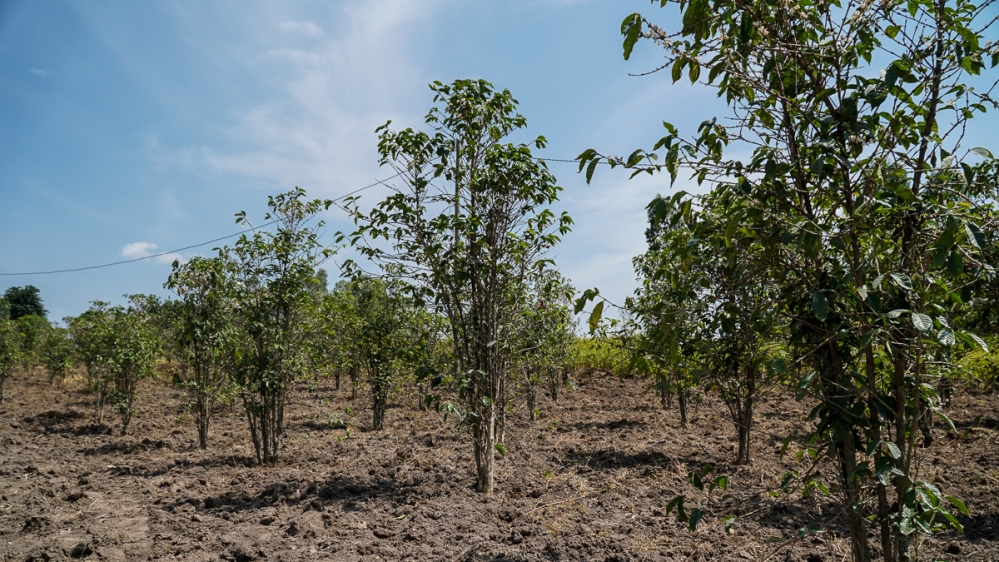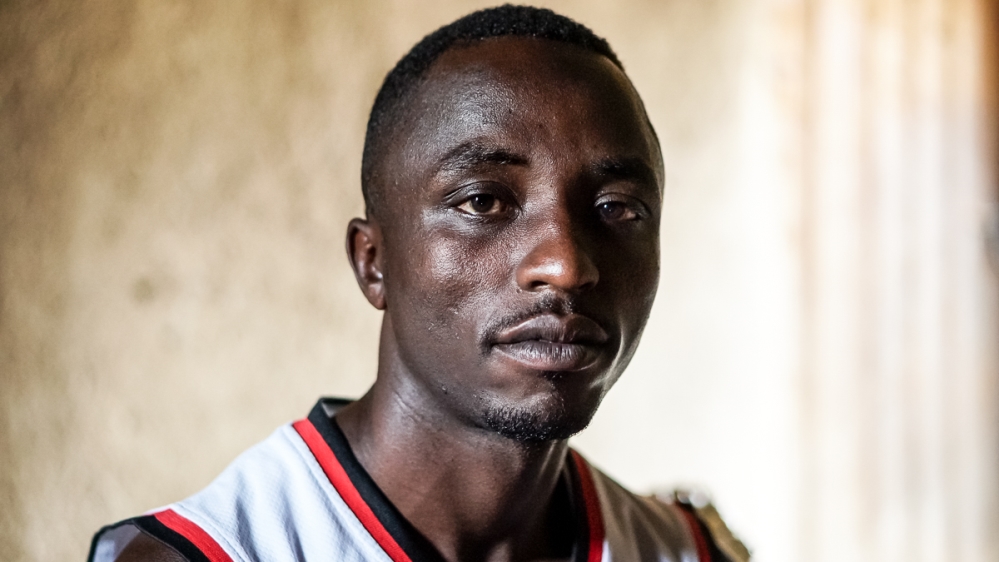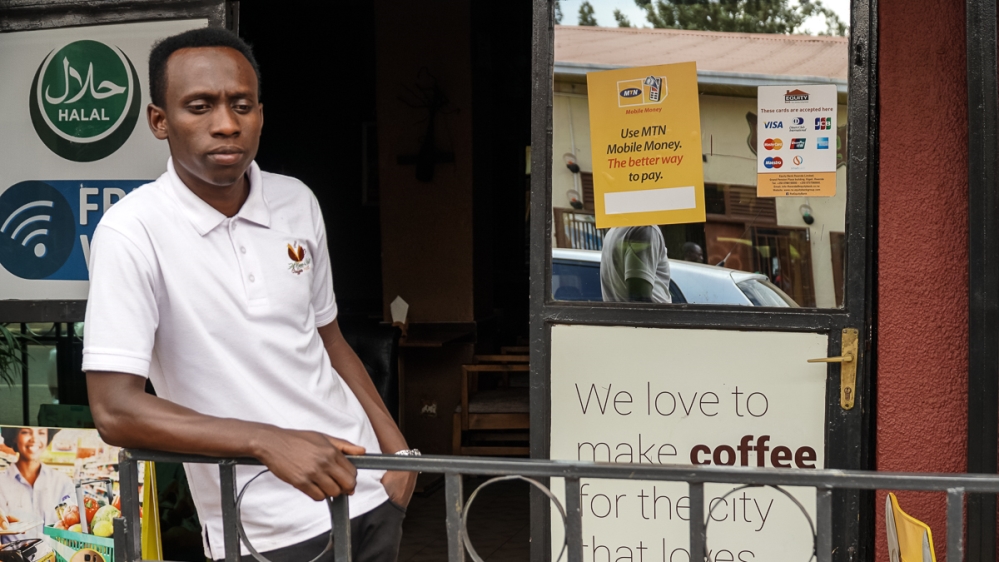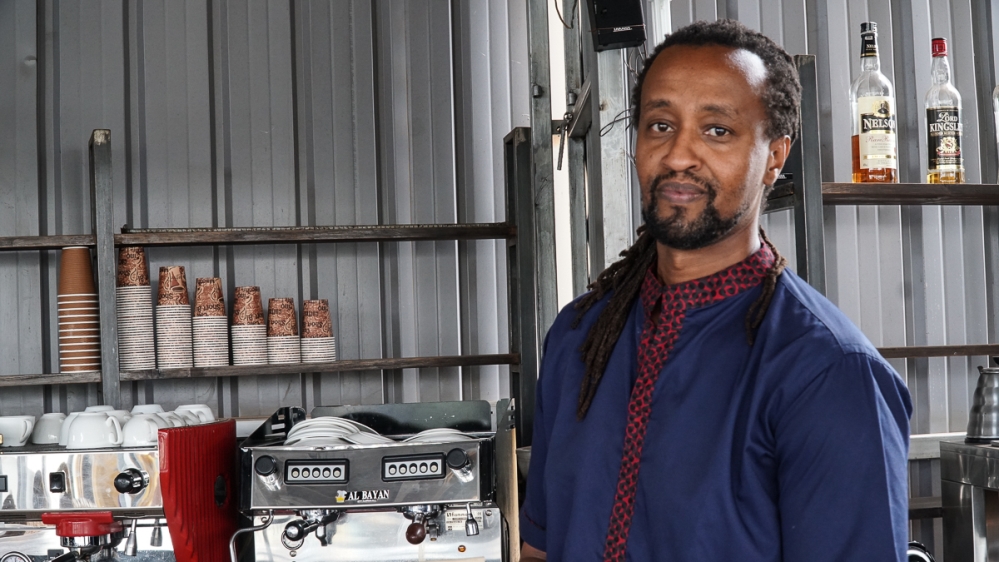Rwanda’s reluctant love affair with coffee
Kigali, Rwanda – Inside Abdul Sibomana’s farm, on the outskirts of Nyanza town in southern Rwanda, dry coffee cherries hang from small stems.
The 30-year-old’s farm sits between a line of small land holdings just off the main highway that snakes its way through sprawling hills dotted with coffee, banana and cassava plantations.
The coffee that’s produced here is known for its vibrant acidic taste – a hint of sandalwood, peach and pecan. But Sibomana is unlikely to tell you that.
Like most others Rwandan farmers, Sibomana almost never drinks coffee. As for his produce? He has never tried it.
“I had a cup of coffee two weeks ago,” he says, with a smile. “It was a Nescafe I got from a restaurant after my graduation.”
Sibomana, who recently took his degree in civil engineering, farms coffee, cassava and potatoes on the small land holding that he inherited from his parents who were killed during the 1994 genocide. More than 800,000 people, mostly minority Tutsi, were slaughtered over the course of 100 days by Rwanda’s Hutu majority.
Orphaned, Sibomana lived with his uncle until he was able to take over the coffee farm and look after his three siblings in 2000. He hasn’t looked back since.
Sibomana is one of some 400,000 farmers across Rwanda earning a living by cultivating coffee. The crop, which last year brought in $58.5m, is key to country’s economy.
Rwanda exports more than 80 percent of its coffee, its second-largest export earner, with just 16 percent of all homegrown produce being consumed domestically, according to Clare Akamanzi, executive director of Rwanda Development Board (RDB).
Rwandans, it turns out, would rather drink tea, soft drinks or a cold beer.
 |
| There are hundreds of thousands of small scale land holdings across Rwanda where some of the country’s best coffee is produced [Azad Essa/Al Jazeera] |
A colonial crop
Teddy Kaberuka, an economic analyst based in Rwanda’s capital, Kigali, says that when coffee was initially introduced by German and Belgian colonists at the beginning of the 20th century, producers would cultivate it and sell it for cash.
“Farmers were never taught to drink coffee in order to supply all the production to the international market,” he says.
“The whole coffee value chain was built and regulated by the government in such as way that coffee would leave the farmers, go to the washing station, go to the exporters and be exported. Coffee crop was a source of revenue to the government therefore there was no effort to promotion the domestic consumption.”
As a result, the country has long relied on the green coffee cherries being exported and roasted into brown beans abroad and then imported back in. This has not only lowered revenues, since roasted beans are worth a lot more than green cherries, but it has also stunted the growth of the domestic coffee culture. In 2016, there were just 15 coffee roasting companies in the country.
Rwandan coffee, in the green cherry form, is mostly exported to Switzerland, the United States and Singapore, with primary African destinations being South Africa, Kenya and Tanzania. It was only in April 2018, that the first consignment of roasted coffee beans left Rwanda for the US.
Another farmer, also from Nyanza, who asked not to be named, shrugs his shoulders when asked about drinking coffee. This farmer, well into his 50s, grows coffee on half-a-hectare plot of land outside his home. He, too, has never had a cup of coffee.
“I wonder sometimes how his coffee goes to America and then comes back,” he says, cynically.
Sibomana, his neighbour, nods and explains: “We aren’t able to consume this coffee because there are few roasting facilities available … this is why we can’t drink it.”
But for Sibomana, drinking coffee is the least of his concerns.
“I keep the coffee plantation as a memory of my parents who started it in 1986. They planted it as a way to generate an income … it is a kind of their legacy,” he says.
 |
| Abdul Sibomana says that through his coffee farm he hopes to pays homage to his parents and earn an income for his family [Azad Essa/Al Jazeera] |
Coffee as a luxury
In the lower-level of the Nyarugenge market in central Kigali, Adnan Saligo runs a small home supply store. Inside, homegrown wheat flour, tea, cassava flour, coffee and toilet cleaners sit side-by-side with rice from Uganda and India, sunflower oil and Nutella from elsewhere.
The 43-year-old says that coffee is not a best-seller in his store. “Tea is seen as a utility, coffee is seen as a luxury,” he says, between serving an almost endless line of clients.
The high cost of coffee is prohibitive for many in a country with one of the fastest-growing economies in central Africa, but where 63 percent of the 12 million-population still earn less than $1.25 per day.
At the House of Coffee in Nyarugenge, a cup starts at RWF 1,500 ($1.70). In the Magda cafe in Kacyiru, a more upmarket business area in Kigali, a cappuccino costs 1,800 ($2.00).
Conversely, tea at a common stall can cost 100 shillings ($0.10). During the coffee season, Sibomana, the farmer from Nyanza, sells one kilogram of green cherries for 200-250 shillings ($0.20). In his village, a cup of Nescafe costs 200 ($0.20).
Tea is seen as a utility, coffee is seen as a luxury.
Adnan Salingo, store owner.
That Rwanda produces quality coffee, mostly out of reach of the population, is not lost on the government. Over the past three years, it has partnered with NGOs and private companies in a bid to encourage Rwandans, including farmers, to consume, or at least taste coffee.
“People don’t consider coffee as their choice, mainly because of the taste and the price,” says Celestine Gatarayiha, from National Agricultural Export Development Board (NAEB).
“But even small things like producing coffee in smaller [affordable] packages, can strengthen the coffee culture in Rwanda.”
For Kaberuka, the economist, the drive to have Rwandans drink more coffee is an economic necessity that will help regulate the price and reduce fluctuations observed on the international market.
“For instance in 2012-13, coffee export revenues fell despite increased production on account of fluctuations in the global coffee market,” he says.
“Also, if farmers drink coffee, they will increase the quality as well and sell a better [product] at higher price.”
But Akamanzi, from RDB, says there is no need to underestimate the importance of the export market.
“We need both domestic and export consumption. Rwanda needs the foreign exchange that exporting coffee brings to the economy so it’s a good thing to export as well,” she says.
 |
| Coffee shops are on the rise in Kigali, but they still aren’t frequented by many Rwandans [Azad Essa/Al Jazeera] |
A matter of taste
Halima Ntirivamunda, 37, owns Al Mann and Ran Coffee House in Nyamirambo, one of Kigali’s oldest areas. She says that since she opened her cafe six years ago almost a dozen others followed suit around the city.
“They copied, and business has gone down,” she says.
Akamanzi, from the RDB, says that the growing number of cafes around the capital is testament to an increase in local appetite for high quality Rwandan coffee.
“These cafes and restaurants are full of young people who, unlike their parents, have learnt to appreciate coffee and coffee culture. This culture shift is driven by the public, not the government,” she says.
But the cafes are still not exactly bursting at the seams with young Rwandans.
Like so many of the other cafes in the capital, Ntirivamunda’s clientele are “mostly tourists and some Rwandans”.
 |
| Che Rupari who owns a cafe in the upmarket Kacyiru is confident that that Rwanda will in time develop a coffee drinking culture [Azad Essa/Al Jazeera] |
Che Rupari, 40, who opened Neo Coffee in Kacyiru four years ago, says that his store sees a combination of locals and expats.
“It’s not part of the culture yet, you know sitting down at a cafe, working, browsing the net, enjoying a beverage, but its changing with the new generation,” Rupari, whose spacious cafe, kitted out with large tables and benches, encourages networking and entrepreneurial events.
Another owner of a cafe in central Kigali, who didn’t want to be identified, says that part of the reason coffee has never been popular is that coffee was seen as “not for us”. “It is as if there is no understanding or idea of the role of coffee has in our lives,” he says.
Aline Uwase, 35, who works in Kigali and “enjoys a coffee twice a week”, argues it’s not just the cost – it’s also the culture.
“It was brought to us in a negative way,” she says. “It’s just not coffee, it was also eggs and poultry. People were taught in the rural areas that these were for white people.”
Though Rwanda does not produce as much coffee as its neighbours Ethiopia or Kenya, aficionados are increasingly recognising the country as a source of specialty or gourmet coffee due to the favourable climate and altitude, especially in the southern and western regions.
And according to people in the industry, it is catching on.
Patrick Ruhumuriza, in his early 20s, says he was so taken with coffee when he first encountered it four years ago, that he taught himself to how become a barista over YouTube.
“I am now a certified barista,” says Ruhumuriza, who now works at Kacyiru’s Magda cafe. “I love watching people drink their early coffee and smile as they wake up,” he adds. “It makes me feel good.”
Ruhumuriza says that since the cafe opened in March 2018, he has seen a steady stream of customers, including Rwandans, come through its doors – even if some are drawn not by the coffee served but the ambience.
Angel Mutoni, 22, a cashier at the same cafe, who also studies law, says coffee is a hit with sleep-deprived students. She admits, however, that many find the taste – and the price – peculiar.
“It is expensive, but when they come, I invite them to taste it. I give them the lightest brew,” Mutoni says.
Still, not all coffee shop workers are as enthused about the brew themselves.
Igor Miller, 21, a waiter at the Bourbon cafe in KTC, one of the first establishments to open in Kigali, says the number of clients has risen over the past year.
“People were not used to it, but they are seeing it differently now,” he says.
Miller adds, however, that no matter the hype, he has yet to take to coffee. “I still don’t like it. I just work here,” he laughs-out-loud.




